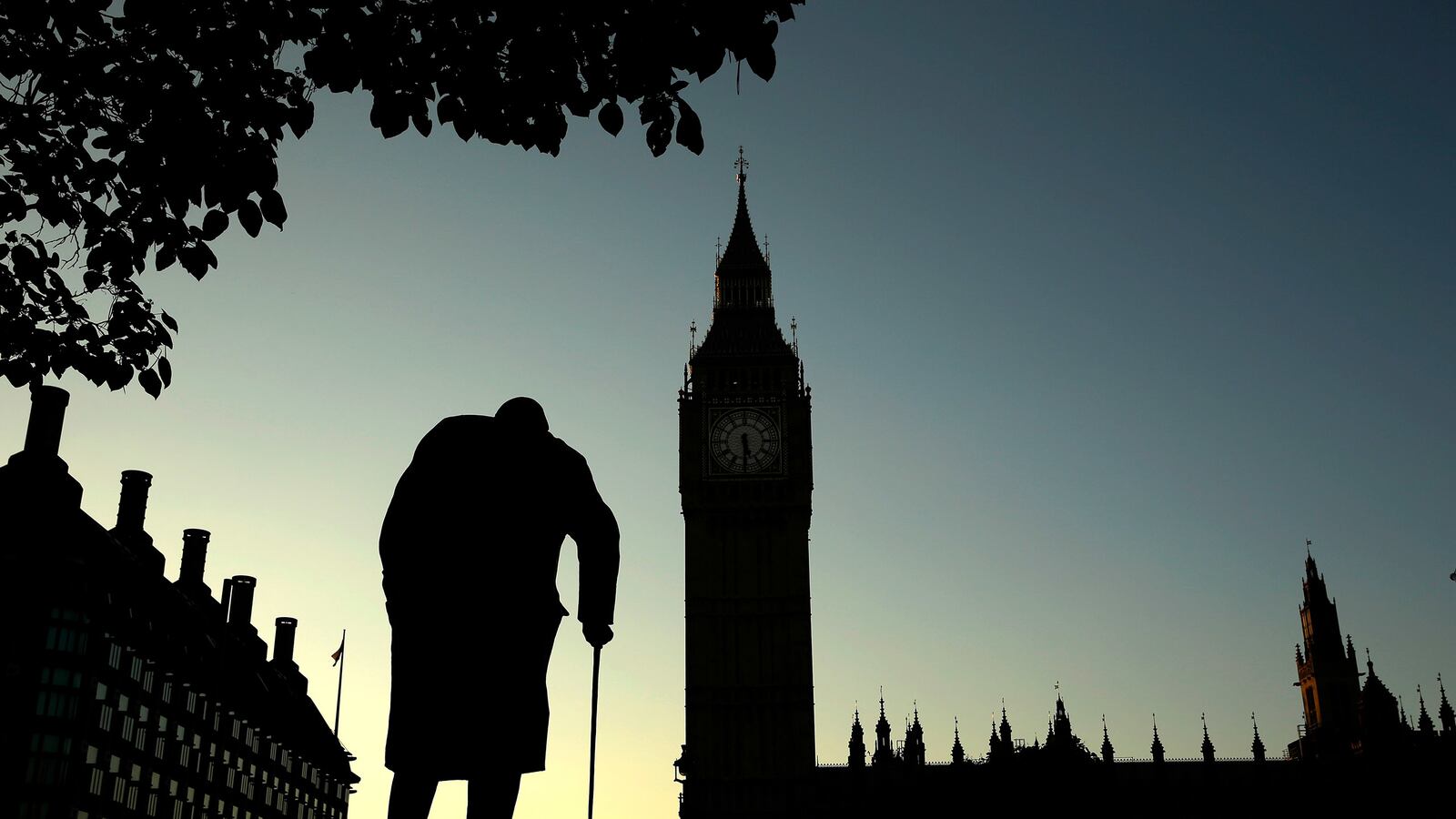Kingsley Amis used to joke that the argument for his nation’s entry into the European Union could be described as, “Britain will lose her independence but at least she will suffer economically.” Well, Britain hasn’t yet acquired her independence—that will come after many painful months of exactly the sort of pettifogging bureaucratic wrangle most Eurosceptics claimed to loathe in the first place—but at least she has suffered an economic catastrophe unseen since the 1980s.
In eight hours after news of the Brexit broke, the U.K. lost $350 billion, which, as Belgian MEP Guy Verhofstadt remarked Friday morning, “is a greater amount than they contributed to EU budget over last 15 years—including rebate.” This has transformed the country overnight from the fifth largest economy in the world to the sixth. It has been overtaken by France, a development that the John Bulls out in force today with Union Jacks must be savoring.
Historical analogies can be a little hysterical at times like these, even if the bar has been set by Lindsay Lohan’s Twitter feed. Still, it is hard not to agree with Russian analyst Ivan Kratsev’s assessment that Brexit is tantamount to “German re-unification in reverse” and spells the end of an epoch that began in 1945 when Europe was facing a far greater refugee crisis and also seeking to avoid another world war. It was then that the original case for “better together” was put forth and eventually carried through by a succession of Tory and Labour governments, underwritten by NATO hard power and Marshall Plan subsidies.
Conservatism is traditionally not rooted in the wholesale dismantling of even badly flawed or malfunctioning political institutions. But David Cameron gambled his career and legacy on the hope that cooler heads in his party would prevail, and perhaps that a risible opposition leader who looks like he gets lost in his own living room would rally to the common cause of pragmatic internationalism.
Instead, Cameron is now out of a job and almost certain to go down as one of the most disastrous prime ministers in British history. His heir apparent, meanwhile, is the Bullingdon Club’s most famous man of the people who helped advance the Brexit argument by intimating that Barack Obama is a closet Mau Mau rebel. (The president doesn’t end his term until mid-January, whereas the PM succession will occur in October, so there is every likelihood that Obama may have to do bilateral business with Boris Johnson.)
Just because Marine Le Pen, Geert Wilders, Gerry Adams, Vladimir Putin and Ali Khamenei are all having a nice day, the triumphal Brexiteers reassure us on the morning after, doesn’t mean that we need to worry. Nor does the fact that the EU’s largest military will have little say in shaping urgent responses to global events, even before its divorce from Brussels is finalized.
While it retains “the decision-making privileges of membership; in reality,” the Guardian reported today, “power will rapidly drain away and British diplomats can expect to be marginalized in the councils of Brussels. The U.K. will keep its veto in some areas, such as tax and foreign policy, but diplomats say Britain’s voice on other EU decisions, for example, on economics and business, will count for little.”
And who will want to compromise on anything with a lame-duck Westminster? “Everything you own in a box to the left” was more or less how the presidents of the European council, commission and parliament greeted the will of the British people, who will now have to count on the magnanimity of these officials in negotiating new trade deals.
Brexit will also lead to a new sort of migration headache as 1.2 million Britons living in EU countries will now either have to repatriate or cut individual work or residency visa arrangements with their hosts, while 3 million non-British residents with EU citizenship will have to do likewise.
How did this happen, and who is to blame?
There were many lies peddled by the Leave camp, none more so than by its grinning junior conductor. Early in the evening, after the latest bookmakers and pollsters had had their say, Nigel Farage all but conceded defeat, rightly professing himself shocked that slightly more than half the country could ever take him seriously.
Farage had insisted throughout the debate that Britain was spending over £50 million per day, or more than £350 million a week, on the EU (the actual figure is less than half that amount) and that a Brexit would mean redirecting those funds to the National Health Service, a claim which the official Leave UK organizers, of which he was not one, had turned into a prominently advertised campaign pledge. But today, on Good Morning Britain, Farage confessed that all that had been a bit of a porky and Leave had been wrong to promise it. So there won’t be a palpable increase in the health of society? Sadly, no.
The grinning ex-commodities trader also declined to tell presenter Susanna Reid how much he thought this piece of propaganda, aimed particularly at a decisive geriatric electorate, had contributed to Leave’s narrow victory or whether that victory could now be seen as honestly or fairly attained.
Farage is but a symptom of a national nervous breakdown, one that was long in the making and entirely avoidable. James Bloodworth, author of a timely book, The Myth of Meritocracy, which more Remain advocates ought to have read before Thursday’s plebiscite, rightly notes that Tony Blair’s New Labour government, in its mad dash for more integration in 2004, did little to address then-incipient concerns about a steady rise in immigration.
The pace of newcomers to Britain far outstripped Labour estimates by orders of magnitude: instead of absorbing 13,000 foreign nationals per year, it has absorbed hundreds of thousands. And while most of these arrivals have ended up giving back more than they took out of society, they nevertheless had an unsettling effect on everyone else. Most revealing was what older immigrants who came to Britain in the 60s and 70s, mainly from the Commonwealth, thought of their younger counterparts. They wanted fewer of them.
No doubt the ongoing misery in Syria and the broader collapse of the Middle East has contributed to this growing disillusionment: 630,000 foreigners arrived in the last year alone. But there were other, older grievances to contend with. The decline of heavy industry, particularly in the midlands and the north, and its replacement by a metropolitan service economy, slowly created an entire underclass of angry, resentful Britons who never quite felt at ease in their own country, much less in 27 others.
The most prescient and sage Eurosceptic was the late historian Robert Conquest, who wrote in the late-1990s, “To say that the larger federal unit will provide so much of a counterattraction, as against nationalism, that it will win in the political field is speculation—and a speculation not justified by the experience of other multinational federations. The world has seen many such arrangements break up—not only the USSR, Yugoslavia and Czechoslovakia but also the United Arab Republic, the Federation of the West Indies, and Malaysia. Indeed one might add in this century the union of Sweden and Norway, and of Austria and Hungary; and, earlier, two separate attempts to form a Central American union.”
Indeed, Brexit will now likely lead to Scottish secession or a reinvigorated second attempt at it, as Nicola Sturgeon and Alex Salmond have both made clear. It may also re-stoke old embers of Northern Irish troubles, as Sinn Fein seems eager to do. And it has already encouraged other departures from insurgent parties and political movements in EU, from France to Italy to the Netherlands.
The tragic irony is that this self harm was actually begun by the most idealistic champions of keeping Europe whole and free. Bloodworth puts it better than I can: “Labour politicians who saw the English working class as a superfluous force who had nowhere else electorally to go. They pushed and pushed and pushed them and today, finally, the great unwanted have pushed back. The salt of the earth were treated as the scum of the earth and, unsurprisingly, they wouldn’t stand for it.”
There is a lesson here for America, too. But I fear we may be too late to heed it.






